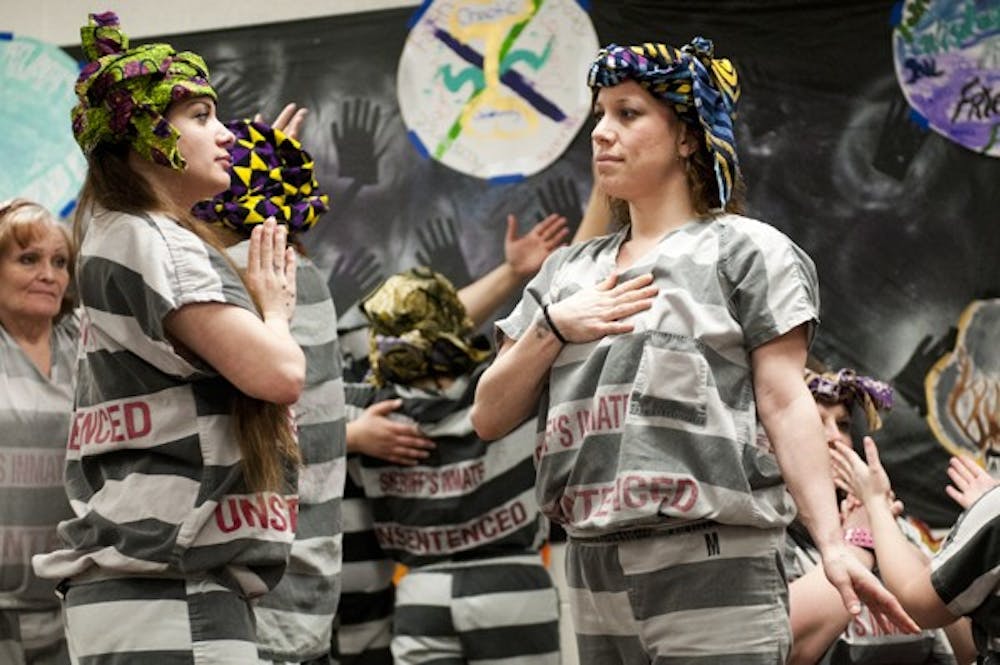 Some of the women kneel as fellow inmates wrap their heads in colorful scarves. The scarves were meant to represent each woman's individual beauty. Click on the photo to view a full slideshow of the performance. (Photo by Molly J. Smith)
Some of the women kneel as fellow inmates wrap their heads in colorful scarves. The scarves were meant to represent each woman's individual beauty. Click on the photo to view a full slideshow of the performance. (Photo by Molly J. Smith)As half of the women kneeled, the other half wrapped colorful scarves that represented each individual's beauty and strength around their fellow inmates' heads.
This display of sisterhood began the performance that culminated the annual Journey Home program, an arts-based collaboration between ASU Gammage, the Estrella Jail and Life Paradigms, Inc.
The women, who ranged in age from 19 to 65, showcased their art and writing and performed a movement piece for an audience at the jail.
The program’s theme was Sacred Woman, and the women depicted the theme with prayers, songs and choreography.
Nicole Marino, 30, said the sacred woman was about finding herself despite being beaten, broken and torn down.
“When I came in, I felt worthless. I felt like I wasn’t anything,” she said. “Being in here just adds to bringing you down, and I wanted to be somebody different."
Angela Houser, 43, said the program taught her self-esteem, that she was not forgotten and that she was not a bad person.
“I made some choices that were wrong, but I’ve taken accountability for them,” Houser said. “I’m moving forward, and I refuse to let being an inmate define me as a person because I know that I’m more than that."
The six-week program provided workshops in creative writing and storytelling, visual arts and movement for 20 participants. A mental health specialist also individually counseled the women.
 The theme of the program was Sacred Woman, meant to celebrate the inmate's womanhood despite the challenges they are facing. Many of the skits incorporated movement and music. Click on the photo for a full slideshow of the performance. (Photo by Molly J. Smith)
The theme of the program was Sacred Woman, meant to celebrate the inmate's womanhood despite the challenges they are facing. Many of the skits incorporated movement and music. Click on the photo for a full slideshow of the performance. (Photo by Molly J. Smith)This is the 11th year ASU Gammage collaborated with team members from Life Paradigms to provide the program for the women.
ASU Gammage Executive Director Colleen Jennings-Roggensack said the program allowed ASU to serve a community in need.
“It’s really the responsibility of each of us to take care of community members who need a hand and the opportunity to become productive," she said. "That happens through the arts."
In the Estrella Jail, participants in the Journey Home program have the lowest rates of slipping back into criminal behavior. This is a testament of the arts, Jennings-Roggensack said.
“The important thing is the power of the arts and the power of these young women to be committed to turning their lives around,” she said. “Arizona State University is about taking on the challenges of our global world, and this is one of those small solutions."
Fatimah Halim, the president and CEO of Life Paradigms, said the arts give the women positive outlets that allow them to express themselves and grow.
“They want to do something better, and they see themselves in a different light once they completed the program,” Halim said.
Many people tend to judge those who are incarcerated, but looking at inmates as family allows people to see them in another light, she said.
“All of us are in jail one way or another, and all of us are free one way or another,” she said.
A full slideshow of the event can be viewed here.
Reach the reporter at jcsolis@asu.edu or follow her on Twitter @jackiecsolis




